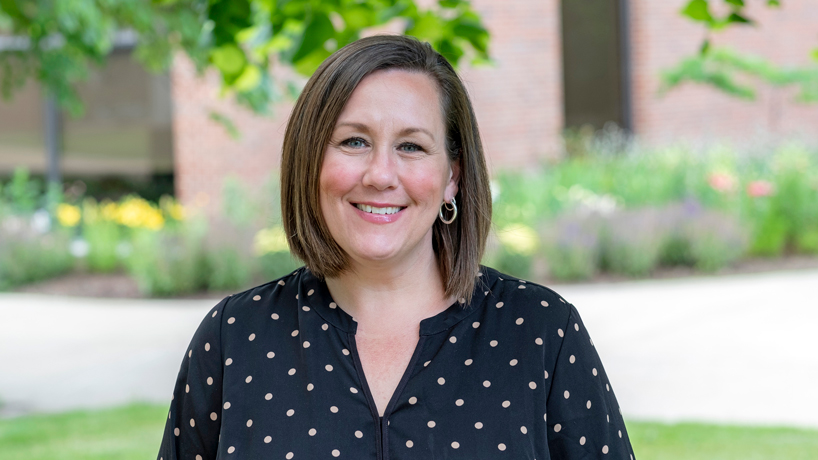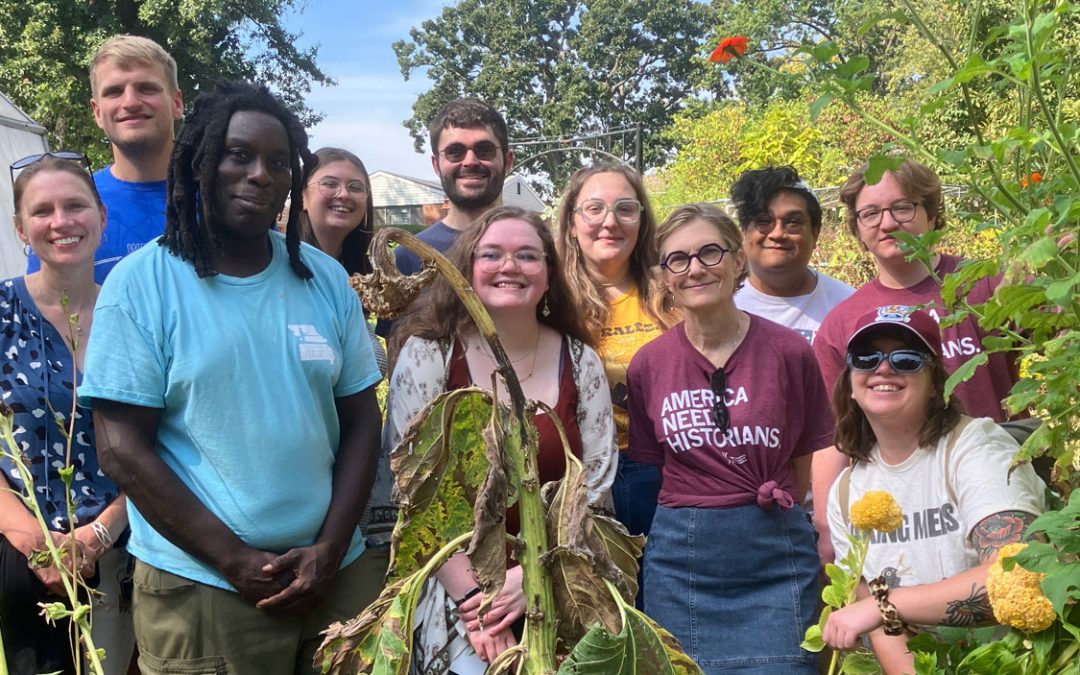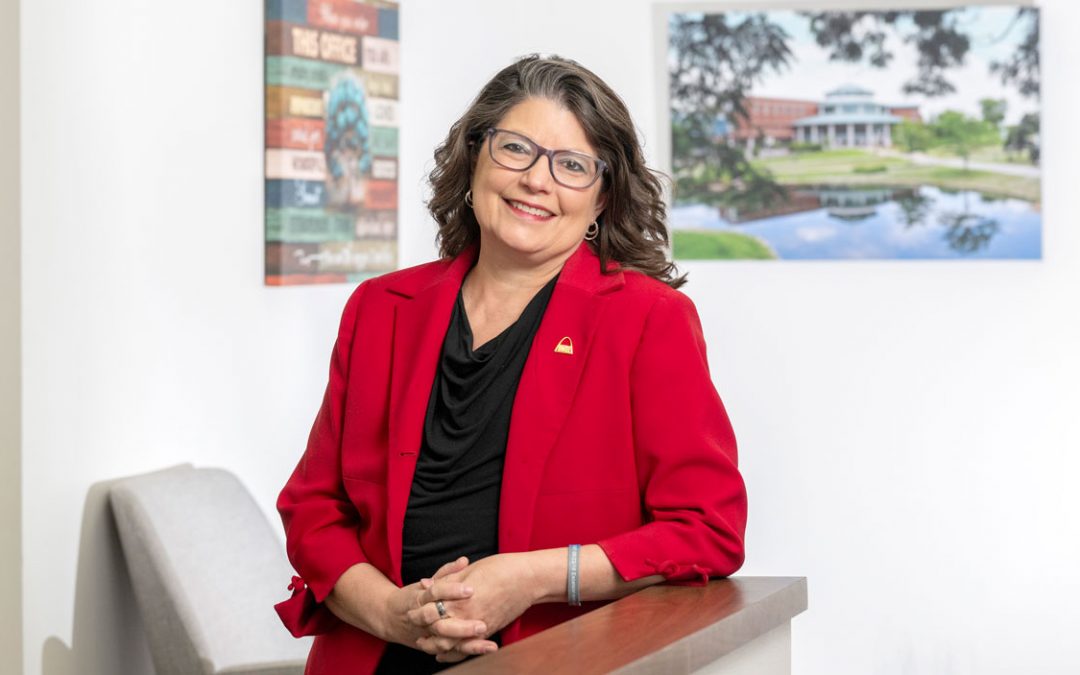
Katie Ellison is directing the Gun Suicide Prevention Planning Project for the Missouri Institute of Mental Health in Butler County, Missouri. The project is funded through a grant from the Missouri Foundation for Health. (Photo by August Jennewein)
Instances of suicide rose steadily –by almost 33 percent – in Missouri between 2012 and 2018, the most recent year for which data is available.
More than 20 out of every 100,000 Missourians died from intentional self-harm in 2018 – a figure that is more than 33 percent higher than the national average. Suicide ranks as the 10th leading cause of death in the state and is the leading cause of death for teenagers and young adults, with people in rural counties more likely to die by suicide than in urban ones.
Project Director Katie Ellison and her colleagues at the University of Missouri–St. Louis’ Missouri Institute of Mental Health have committed those facts to memory because they’re intent on working to change them. One way is by trying to reduce the availability of guns for people with suicidal ideation or substance use disorder.
“We know that firearms are the most lethal method in the US,” Ellison said. “They’re the most common method by which people die in a suicide attempt, and the science also says that because the suicide crisis can be so brief, if we make them hard to access or unfirable, then someone can interrupt that suicide crisis. That person has enough time to think through and work their way out or self-resolve those suicidal feelings.”
Since February, Ellison has been helping lead the Gun Suicide Prevention Planning Project, which aims to build a coalition to focus on mental health and suicide prevention. The plan being developed in Southeast Missouri is funded by a $350,000 grant from the Missouri Foundation for Health. Associate Research Professor Elizabeth Sale is the primary investigator.
The project engages members of the community in Butler County, Missouri – home to the town of Poplar Bluff – including health care providers, educators, employers, clergy members, suicide attempt and loss survivors, LGBTQ individuals and others through a public awareness campaign. It also aims to build a continuity-of-care program throughout the community so that at-risk individuals are getting the support they need.
But another layer of the project involves training on lethal means reduction.
“We’re partnering with the gun owners and gun retailers in the communities to promote safe storage strategies among their customers, with agreement that everyone would like to know how to prevent suicide,” Ellison said. “Responsible gun owners don’t want people dying by suicide. So, it’s getting everyone to buy into this the strategy, this effort to prevent suicide.”
These evidence-based approaches are already being used and finding success in different parts of Missouri, including in Butler County.
The Missouri Department of Mental Health has funded the Zero Suicide Initiative with Family Counseling Center, a private certified community behavioral health organization serving 19 counties in Southeast Missouri. Zero Suicide’s framework is used by health care systems to ensure that someone at every point of contact with a patient is assessing for suicide and referring those in need to supports that can help.
Family Counseling Center also takes part in the Emergency Room Enhancement Program, which supports individuals who present at emergency rooms with behavioral health concerns by coordinating care that addresses behavioral, physical and basic needs.
These initiatives have similar goals, but they’ve been siloed. The Gun Suicide Prevention Planning Project seeks to coordinate those efforts along with work Ellison has been doing since 2018 as director of the Safer Homes Collaborative. That project raises awareness that suicide can be prevented through safe gun storage.
“I think the overall goal is creating this community cultural shift where there is a community acceptance to talk about and tell folks, ‘Hey, I’m struggling, I’m hurting,’” Ellison said. “Creating a community that is able to recognize and identify those risk factors for folks where they spend most of their time – whether it’s at work, it’s at school, it’s at home, it’s in the church – so that those connections, those relationships that they have, can identify their risk and also guide them through this process of getting help.”
The team at MIMH intends to involve some of the largest employers in Butler County in their efforts to raise awareness and train people to recognize people who are at-risk. Among the employers identified are manufacturers Briggs & Stratton, Gates Corporation and Mid-Continent Steel & Wire; Three Rivers College; three area school districts; Poplar Bluff Regional Medical Center and Missouri Highlands Medical Clinic; and the county government.
The grant supports two years of planning with additional funding for up to five years for implementation.
Ellison and her colleagues are piloting the project in Butler County, but they have already identified six other nearby counties – Carter, Dunklin, Pemiscot, Reynolds, Ripley and Wayne – where they intend to build on those efforts.
“The goal,” Ellison said, “is that this is something that could be replicated in other communities across Missouri.”














